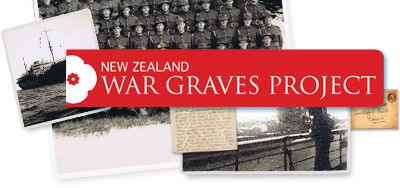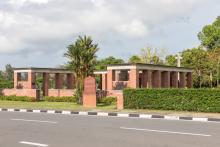Donald John Stott was born in Birkenhead on 23 October 1914, and grew up in the district.
When he left school he joined the New Zealand Herald as a rotary machinist. He enlisted in the New Zealand Army in 1940, and quickly rose to the rank of Sergeant in the artillery.
During 1940 he left New Zealand with the Second Echelon. He fought in Greece and in the Crete campaign of May 1941, where he was wounded and captured by the Germans. After spending two months in a Prisoner of War camp in Greece he escaped, and after seven months on the run, managed to obtain a boat and sail across the Mediterranean Sea to North Africa where he rejoined his unit.
In 1942 Don Stott was commissioned. He was asked if he was interested in going back to Greece to carry out sabotage work, to which he readily agreed. He attended a parachute course, and after many delays, finally parachuted into Greece in March 1943, where he made contact with guerilla bands who were fighting the Germans.
During his period in Greece, Don Stott was responsible for many acts of sabotage, one of which was carrying out a daring raid that resulted in the demolition of the strategically crucial, heavily defended and virtually inaccessible Aspos Gorge railway viaduct, one of the greatest exploits of the Second World War, and one which changed the course of the war in Greece. For this action he was recommended by his commanding officer for The Victoria Cross, but because there had been no shots fired during the action, was eventually awarded the Distinguished Service Order. The Colonel who was Second-in-Command of the British Mission to Greece described Don Stott as "the bravest man I ever knew".
Towards the end of 1943 the Germans realised that the war on the Eastern Front was going badly for them, and as Italy had capitulated, the odds were against them. They therefore wished to discuss the possibility of a truce. The Mayor of Athens approached Don Stott and asked him to a meeting with the Germans to discuss proposals for peace. Although this would place him at considerable risk, Don agreed to take part, and after many meetings was given safe passage by the Germans to Turkey, from where he returned to Cairo to put the proposals to the Allies. Although nothing came of the proposals, Don was awarded a Bar to his D.S.O. for his part in the operation.
Major Don Stott returned to New Zealand in May 1944, before going to Australia where he was on loan to the Australian Army as an expert on Special Service work. There he was attached to "Z" Special Unit, a highly secret force of commandos and saboteurs, which was to create havoc behind enemy lines in south-east Asia.
This unit, with Major Don Stott in command, was sent on a special operation into Japanese territory in Borneo. The unit was taken to the area by submarine, and on the night of 20-21 March 1945, a very stormy night, set off in folboats (similar to kayaks) for the shore. Major Don Stott was never sighted again.
On that day New Zealand lost one of its bravest heroes, a man who, perhaps, had come to the end of his nine lives after cheating death so many times. He had crammed more into his 30 years than most people would into two lifetimes.
Greater detail of his exploits may be gained by reading the book "New Zealand's Secret Heroes" by Gabrielle McDonald, published by Reed Books.
anon author, Birkenhead RSA website.







